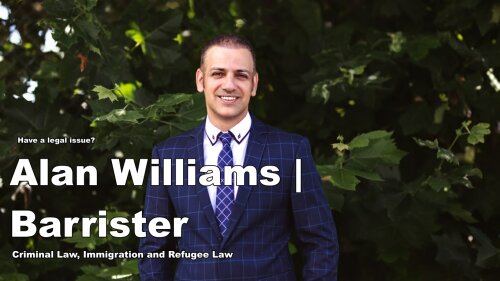Best Speeding & Traffic Ticket Lawyers in New Zealand
Share your needs with us, get contacted by law firms.
Free. Takes 2 min.
Or refine your search by selecting a city:
List of the best lawyers in New Zealand
About Speeding & Traffic Ticket Law in New Zealand
In New Zealand, traffic laws, including those related to speeding and traffic tickets, are governed under the jurisdiction of various legislations, such as the Land Transport Act 1998. Enforcement is primarily carried out by the New Zealand Police, who are responsible for monitoring compliance and issuing fines when necessary. Speed limits, demerit points, and penalties for traffic offenses are defined to enhance road safety for all road users. Understanding how these laws work can help individuals navigate the complexities associated with receiving a traffic ticket.
Why You May Need a Lawyer
There are several scenarios where you might require legal assistance with speeding or traffic tickets in New Zealand:
- If you believe you have been wrongfully accused of a traffic violation and wish to challenge the ticket in court.
- If facing charges that could lead to significant fines, demerit points, or license suspension.
- For guidance on reducing penalties or negotiating for alternative resolutions, such as defensive driving courses.
- When there are complications, such as receiving tickets in commercial driving situations, which can affect employment.
Local Laws Overview
In New Zealand, the key aspects of laws relevant to speeding and traffic tickets include:
- Speed Limits: Urban areas typically have speed limits of 50 km/h, while rural roads often permit speeds of up to 100 km/h.
- Demerit Points: Points are assigned for various traffic infringements, and accumulating too many can result in license suspension.
- Enforcement Methods: Police use methods like speed cameras and radar guns to enforce speed limits.
- Infringement Notices: Issued for traffic violations, these notices detail the offense and the corresponding penalties.
Frequently Asked Questions
What should I do if I receive a traffic ticket?
You have the option to pay the fine, dispute the ticket, or seek legal advice on how to proceed based on your circumstances.
Can a lawyer help reduce my fines or penalties?
Yes, a lawyer can negotiate on your behalf and potentially reduce fines, get charges dismissed, or arrange alternative resolutions.
Is it worth contesting a traffic ticket in court?
This depends on your situation. If you believe the charge is incorrect or if the penalty significantly impacts you, it might be worth contesting.
What are the consequences of not paying a traffic fine?
Unpaid fines may lead to additional penalties, including increased fines, court action, and possible restrictions on your driver’s license.
How many demerit points lead to a license suspension?
If you accumulate 100 or more demerit points within two years, your license will be suspended for three months.
Can I drive in New Zealand with an overseas license and how do speeding laws apply?
You can drive on an overseas license for up to 12 months. Speeding laws apply similarly, and violations carry the same penalties.
What factors could impact the outcome of contesting a ticket?
Evidence such as witness statements, technical inaccuracies, and lawful justifications can influence the outcome.
What is the process for disputing a speeding ticket?
You must contact the relevant authority within 28 days of receiving the notice to declare your intention to contest the ticket.
Does New Zealand have fixed speed cameras?
Yes, fixed and mobile speed cameras are used across the country to enforce speed limits.
What are my rights if stopped by the police for speeding?
You have the right to be informed of the reason for being stopped, to receive a clear explanation of the charge, and to challenge any inaccuracies.
Additional Resources
For more information, consider reaching out to the following resources:
- The New Zealand Police website - for official traffic regulations and processes.
- The New Zealand Transport Agency - for driver licensing and demerit info.
- Community law centers - for free or low-cost legal advice.
Next Steps
If you need legal assistance with a speeding or traffic ticket, consider the following steps:
- Consult a Lawyer: Look for lawyers specializing in traffic law for an initial consultation.
- Gather Evidence: Collect any relevant documents, tickets, and evidence that may support your case.
- Document Your Case: Record any details related to the incident or interactions with authorities.
- Consider Alternatives: Explore options like defensive driving courses if they can mitigate penalties.
Lawzana helps you find the best lawyers and law firms in New Zealand through a curated and pre-screened list of qualified legal professionals. Our platform offers rankings and detailed profiles of attorneys and law firms, allowing you to compare based on practice areas, including Speeding & Traffic Ticket, experience, and client feedback.
Each profile includes a description of the firm's areas of practice, client reviews, team members and partners, year of establishment, spoken languages, office locations, contact information, social media presence, and any published articles or resources. Most firms on our platform speak English and are experienced in both local and international legal matters.
Get a quote from top-rated law firms in New Zealand — quickly, securely, and without unnecessary hassle.
Disclaimer:
The information provided on this page is for general informational purposes only and does not constitute legal advice. While we strive to ensure the accuracy and relevance of the content, legal information may change over time, and interpretations of the law can vary. You should always consult with a qualified legal professional for advice specific to your situation.
We disclaim all liability for actions taken or not taken based on the content of this page. If you believe any information is incorrect or outdated, please contact us, and we will review and update it where appropriate.
Browse speeding & traffic ticket law firms by city in New Zealand
Refine your search by selecting a city.
















